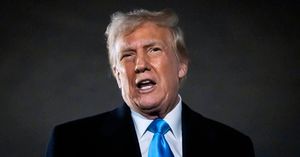Doug Burgum, the former governor of North Dakota, has been confirmed by the U.S. Senate to lead the Department of the Interior, marking a significant shift toward energy dominance under President Donald Trump’s administration. Burgum was confirmed on January 30, 2025, with bipartisan support, receiving 79 votes in favor and 18 against. This appointment positions him as the 55th Secretary of the Interior, overseeing vast federal resources including national parks, wildlife refuges, and the Bureau of Indian Affairs.
During his confirmation process, Burgum expressed his commitment to advancing U.S. energy production, emphasizing the need for deregulation to enable faster development of resources. "Serving as Interior Secretary is an opportunity to redefine and improve upon the federal government’s relationship with tribal nations, landowners, mineral developers, outdoor enthusiasts, and others," he said, aligning with President Trump’s vision of promoting American "Energy Dominance — which is the foundation of American prosperity, affordability for families, unrivaled national security, and world peace."
Republican Senate Majority Leader John Thune highlighted the importance of Burgum’s background, stating, "People in places like my state...know the farmer, the rancher, the forester, and other landowners are some of the best conservationists." This sentiment reflects the expectations from Burgum as he manages public lands, balancing energy ambitions with conservation efforts.
On February 1, 2025, Burgum was officially sworn in, just days after his confirmation. He reiterated his plans to drastically change the direction of the Department of the Interior, pointing out, "If the Interior was a public company, its stock would be in the tank." He underscored the need to eliminate bureaucratic hurdles, stating, "This deregulation order is extremely important because we need to shorten the time it takes to build things in America."
Under his leadership, the Department of the Interior will manage significant agencies like the National Park Service and the Bureau of Land Management, all of which play pivotal roles in America’s energy strategy. Burgum’s administration will focus on maximizing the responsible usage of natural resources, ensuring environmental stewardship remains at the forefront. "We’re talking across the whole country, including Alaska especially, a great opportunity," he remarked, outlining his vision for sustainable practices alongside increased production.
Burgum has also been tasked to lead the newly established National Energy Council, which aims to streamline bureaucratic processes affecting energy production. President Trump expressed confidence stating, "He’s going to help our country become extremely liquid and extremely wealthy again," alluding to Burgum’s strengths as both a businessman and former governor.
Industry advocates are hopeful about Burgum’s leadership, as many believe streamlined permitting processes on federal lands could accelerate broadband deployment—a significant issue, especially for rural areas lacking resources. Jonathan Spalter, president of USTelecom, stated, "With broadband spurring economic growth...Secretary Burgum will have the opportunity to get rid of the red tape delaying permitting approvals on federal lands."
Overall, Burgum’s confirmation embraces the broader Republican strategy favoring increased fossil fuel production, with Burgum positioned as the driving force within the federal government’s policies. His background as governor, where he frequently criticized the prior administration’s energy policies, aligns closely with the Trump administration’s agenda, potentially paving the way for aggressive energy initiatives.
While this marks the beginning of Burgum’s tenure, challenges loom. How he balances the need for energy development with the conservation of public lands and the rights of tribal nations will remain under scrutiny. His connection with North Dakota’s energy policy, along with financial ties to oil and gas interests, will also prompt discussions about transparency and ethical governance going forward.
Indeed, Doug Burgum’s role at the Department of the Interior signals not only changes for the agency but also for American energy policy at large, promising to shape the narrative of energy dominance as envisioned by the administration.



